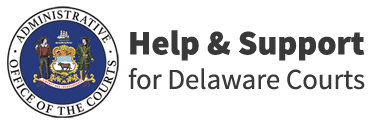Preparing For Trial in the Justice of the Peace Court
How you prepare and what you do to prepare for a trial will vary and depend on the specific facts and circumstances of your case. The following information is provided as a guideline and is not intended to be all-inclusive. As a reminder, the court clerks may not provide legal advice or recommendations.
Here are some important things to remember about preparing for trial:
- You should be sure to know the exact date and time of your trial and be there on time. If you settle your case before the date set for trial, notify the court in writing, so that the court may plan for other cases to be heard.
- Although the Justice of the Peace Court is less formal than the higher courts, the Rules of Evidence must still be followed. You should try to familiarize yourself with some of the most important Rules as described in "Questions and Answers About the Rules of Evidence.". For further information see the Delaware Uniform Rules of Evidence.
- You should bring with you to trial all papers, documents, materials or pictures which have anything to do with your case. Bring all written materials, including, but not limited to receipts bills, and estimates to show to the judge to help prove your claim or counterclaim – both that you were injured or lost money and the actual damages (monetary amount) that you have suffered. If your claim is for automobile or other property damage, you may bring a qualified witness to testify to the damages caused by the other party and the cost to repair the damages, or you may bring repair estimates, receipts or cancelled checks.
- Courtroom Technology Policy:
The Court does have some limited ability to allow electronic files to be displayed on a projector in certain courtrooms. Parties wishing to display electronic files in the courtroom must notify the Court in writing in advance to make sure the equipment is available at the time of trial.
The courtroom equipment is exclusively for the display of evidence to the Court through files stored on CDs, DVDs and USB devices. The courtroom equipment will accept the following file formats: .AVI, .MP4, .MOV, .WMV, .MPEG1, .MPEG2, .MPEG4, .DIVX, .MPG, .MPEG. The courtroom equipment should not be used for any other purpose. Any media used on the courtroom equipment must be virus and Trojan free. Also any media containing inappropriate or illegal information is prohibited on this device. The courtroom equipment is not networked and will not allow access to any external sites. -
You should also bring any other witnesses who can help you explain your case.
(A written statement from witnesses who cannot appear in court for you cannot be considered
by the judge
because of the Rules of Evidence
(and the inability of the other party
to cross-examine the witness as to the statement contained in the document.)
Make sure your witness knows the exact date, time and place of the trial and then
make sure the witness appears for trial. If you are not sure that a witness will
show up at court, you may subpoena the witness (have the court order the person
to appear at court to testify) by filing a request for a subpoena with the court.
There is a $10.00 charge for each subpoena.
Requests for subpoenas for the attendance of witnesses, production, inspection or copying of materials, or inspection of the premises should be filed at the earliest possible opportunity following service of the complaint on the Parties. Filing a request for a subpoena must be done no later than 5 business days before trial otherwise the Court cannot guarantee service. Subpoenas requested which appear to be unreasonable or place an undue short notice or burden on the recipient may be denied by the Court (J. P. Civil Rule 45). - Remember, whether you are the plaintiff or the defendant, you must appear at the trial, or you will lose the case. A non-suit may be entered against a plaintiff who fails to appear and a default judgment may be entered against a defendant who fails to appear. If there is a valid reason why you cannot be in court on the day of the trial, write the court, if possible, or call, if not, to request a continuance (postponement) to another date. In your continuance request please state why you need a continuance and whether the other party or attorney agrees with the continuance request (if it is possible for you to ask their position on your request). Please take note that any continuance request received less than 48 hours prior to trial, or repetitive continuance requests, will most likely be denied unless there is a true emergency.


